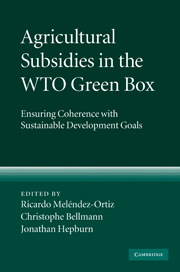Book contents
- Frontmatter
- Contents
- List of contributors
- Preface
- Acknowledgements
- List of abbreviations
- 1 Overview
- PART I The recent evolution of agricultural trade policy reform
- PART II The focus, extent and economic impact of green box subsidies
- PART III Green box subsidies and developing countries
- PART IV Green box subsidies and the environment
- PART V Looking forward: how can change take place?
- 19 Improving monitoring and surveillance of green box subsidies
- 20 EU subsidy reform: options for achieving change
- 21 Subsidy reform in the US context: deviating from decoupling
- 22 Agricultural trade policy reform in Japan: options for achieving change
- 23 Towards a green box subsidy regime that promotes sustainable development: strategies for achieving change
- Appendix: Text of Annex 2 of the WTO Agreement on Agriculture (“the green box”)
- Index
23 - Towards a green box subsidy regime that promotes sustainable development: strategies for achieving change
from PART V - Looking forward: how can change take place?
Published online by Cambridge University Press: 03 May 2010
- Frontmatter
- Contents
- List of contributors
- Preface
- Acknowledgements
- List of abbreviations
- 1 Overview
- PART I The recent evolution of agricultural trade policy reform
- PART II The focus, extent and economic impact of green box subsidies
- PART III Green box subsidies and developing countries
- PART IV Green box subsidies and the environment
- PART V Looking forward: how can change take place?
- 19 Improving monitoring and surveillance of green box subsidies
- 20 EU subsidy reform: options for achieving change
- 21 Subsidy reform in the US context: deviating from decoupling
- 22 Agricultural trade policy reform in Japan: options for achieving change
- 23 Towards a green box subsidy regime that promotes sustainable development: strategies for achieving change
- Appendix: Text of Annex 2 of the WTO Agreement on Agriculture (“the green box”)
- Index
Summary
Introduction
The objective of this chapter is to provide trade negotiators and policy-makers with insights into strategies that could be pursued to encourage the reform of green box subsidies, including through trade negotiations and litigation, in order to promote a subsidy regime that is more supportive of sustainable development goals. The analysis is based on an understanding of the political economy of agricultural trade policy-making and seeks to make sense of green box reform within the context of subsidy reform more generally.
Before engaging in this discussion, however, it must be recognized that although developing countries have the option of a wide array of domestic support exemptions in the WTO Agreement on Agriculture (AoA) as it stands now (paragraph 6.2 and higher de minimis, as well as green box), many countries cannot afford the high costs of agriculture support and do not have the necessary expertise to implement many of these programmes. It should also be noted that many developing countries, particularly those in the earlier development stages, discriminate against their own agriculture sectors. Besides export taxation – justified in many developing countries by limited resources for tax collection – industrial policies, macroeconomic factors and underinvestment in rural infrastructure, research and extension services continue to reflect an anti-agricultural bias. Concerns about food supply for poor consumers also lead governments to intervene in agricultural markets, bringing domestic prices down below international levels. This discrimination against agricultural producers can impair development efforts.
- Type
- Chapter
- Information
- Agricultural Subsidies in the WTO Green BoxEnsuring Coherence with Sustainable Development Goals, pp. 633 - 646Publisher: Cambridge University PressPrint publication year: 2009



